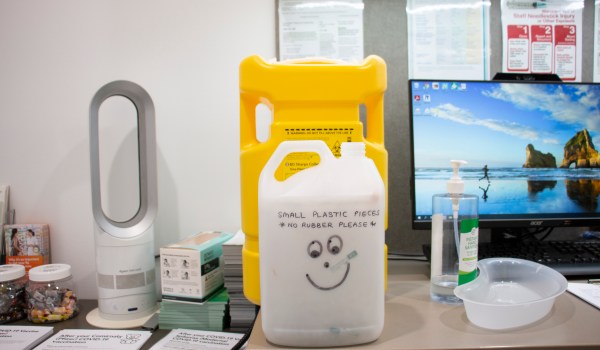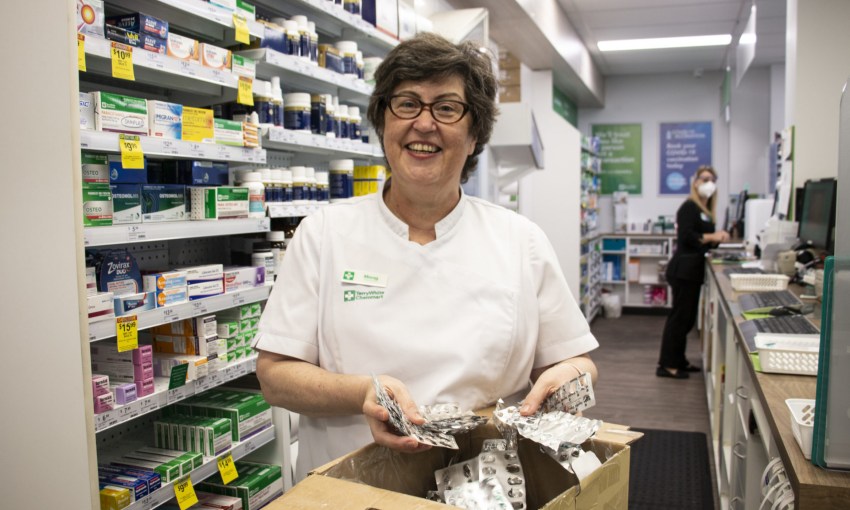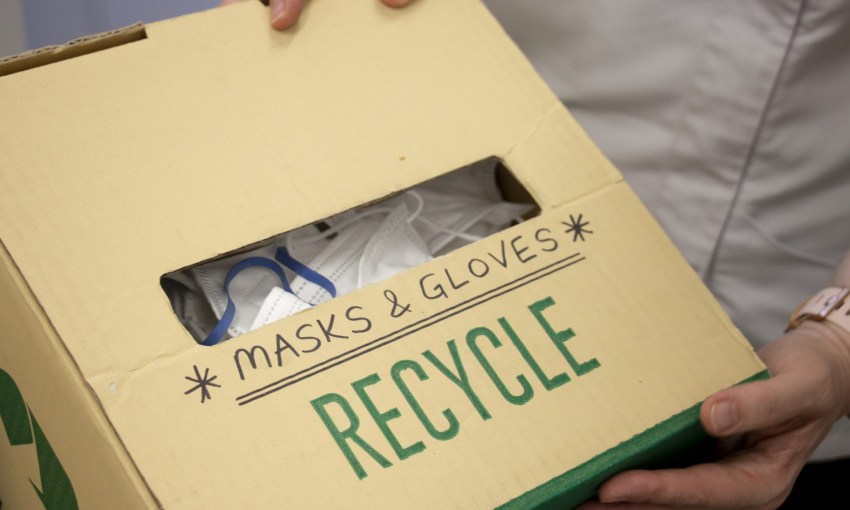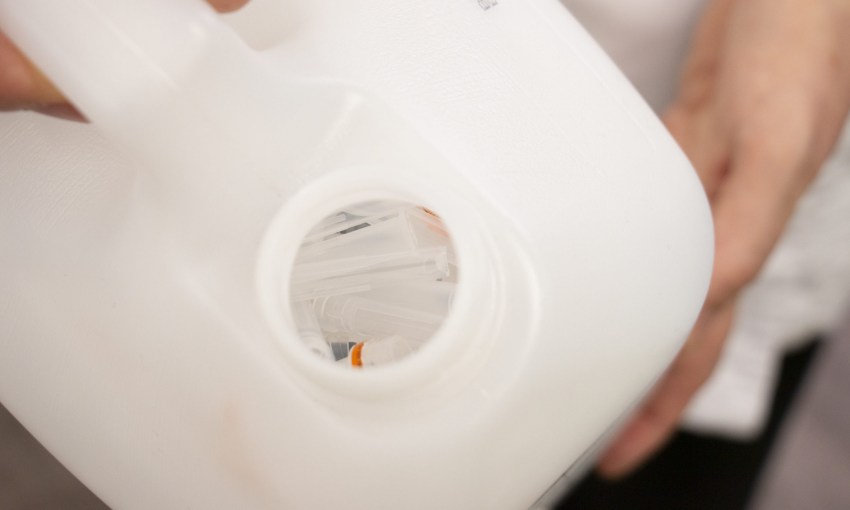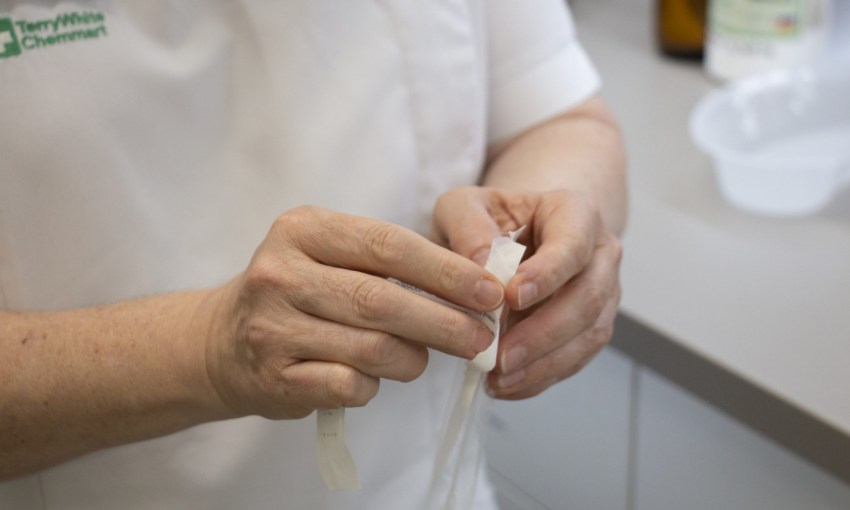Morag Horton is the owner of Melbourne Street’s Terry White Chemmart, where she accepts and recycles a large amount of the city’s spent pharmaceutical blister packets each year, at a personal cost of roughly $6000 per annum. She wants local councils to step in and lighten the load.
Meet North Adelaide’s most stubborn super recycler
Morag Horton’s hand disappears into a tall cardboard box and emerges clutching dozens of silver sheets. They’re blister packs – pre-formed plastic packaging used to seal small consumable goods like medication.
If you want your local pharmacy to order blister pack recycling bins, visit the TerraCycle website for more information.
These slips are a necessary bi-product of keeping the community healthy. But due to being made from a mixture of foil and plastic, they’re hard to recycle and often end up in landfill. Despite this, Morag, a Melbourne Street business owner and city ratepayer, has taken it upon herself to salvage the trash left in the city’s too-hard-to-recycle basket.
“When we moved the pharmacy into this site, which was two-and-a-half years ago, I made a decision to draw a line in the sand and say no to single-use plastic and to really look at the ways that we could reduce our environmental impact,” Morag tells CityMag.
“We reduced our landfill by about 90 per cent.
“We recycled absolutely everything that we can, but the only thing was medication blister packs. I investigated options available, and when I found out that there was an option available, I started doing that in-store for the blister packs that we generated when packing medication packs for people.
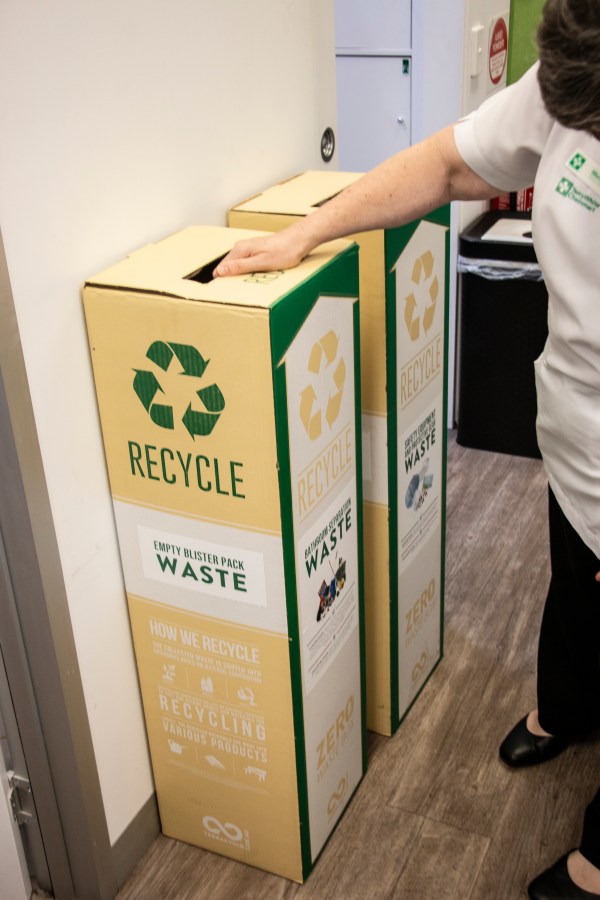
The blisterpack collection bin
“I decided that I would offer that to my customers and my community, and so I’ve been doing that for about 12 months. I guess people, on the grapevine, heard.”
Morag orders metre-tall cardboard collection boxes from US recycling business TerraCycle. When she first started the initiative, only regulars and those in the neighbourhood would drop off their spent blister packs. Demand has since increased.
“At the beginning, it was taking about a month to fill them, but now it’s one to two weeks to fill them,” Morag says.
“News has got out and people are coming from all around Adelaide to drop the blister packs off here.”
While it’s normally good news when people enthusiastically embrace recycling, Morag is footing the bill for this service. And it’s not cheap. Each collection bin costs $277 to order. She estimates over the year she’s spent roughly $6000 recycling her and other people’s blister packs.
She says she wouldn’t mind paying if these people also filled their prescriptions at her store, thus creating a circular economy. But they’re not.
“I do talk to a lot of people who have come with blister packs that they’ve collected up from all their friends and neighbours and community groups and then they bring them here to drop off, so it is costing me a lot of money,” Morag explains.
“Yesterday I had someone who travelled from Gawler. They tend not to travel here specifically for that. But when they’re making a trip into town, [they’ll] do the drop off here.”
Despite the cost, Morag believes it’s every citizens’ duty – including hers – to reduce waste and recycle. She is now encouraging the Adelaide City Council, and all other suburban councils, to investigate methods of reducing their landfill.
Morag’s initiative was discussed at an Adelaide City Council meeting on Tuesday night. Councillors debated a motion introduced by area councillor and Greens affiliate Keiran Snape, asking for the City of Adelaide to formally thank Morag for her “community spirit and values”, while also providing a recycling drop-off point at the Pirie Street Customer Centre and North Adelaide Community Centre for blister packs.
The idea is this would alleviate some of the pressure from Morag.
“Blister packs, quite simply, is these medication packets which most of us have used in every day scenarios. They’re actually incredibly difficult to recycle,” councillor Snape told the chamber.
“We believe there’s only three locations, including Morag’s store, where we can recycle within metropolitan Adelaide.
“Quite simply, my motion is for [the] council to provide a couple of [drop-off] locations.”
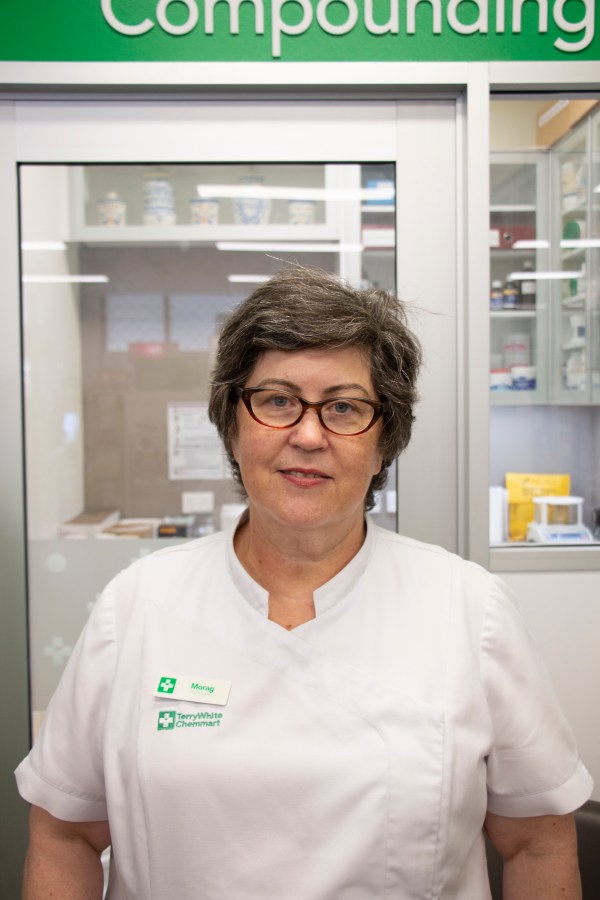
Morag Horton
The motion was debated and ultimately passed, with amendments based on suggestions made by north ward councillor Mary Couros and south ward councillor Alex Hyde.
Rather than immediately providing an alternative drop-off point for blister packs in two city council centres, the amended motion asks for the council administration to first prepare a report for council members by April.
The report would investigate recycling drop-off points at city businesses and community centres for blister packs and other waste, such as batteries, polystyrene and small electronics.
It would also consider other waste categories that could be recycled, noting the City of Adelaide’s most recent waste audit.
The council adopted the Resource Recovery Action Plan (Organics, Recycling and Waste) 2020-2028 in November 2020, with the document’s vision to achieve “zero avoidable waste to landfill”.
“Aligning with the State Government’s target, this equates to: ‘the diversion of all waste from landfill where it is technologically, environmentally and economically practicable to do so,” the report says.
“‘Unavoidable’ waste therefore refers to wastes for which no other current treatment is available including (but not limited to) asbestos, toxic and quarantine waste.”
Central ward councillor Jessy Khera initially expressed concern regarding councillor Snape’s proposal, saying it would “place an unnecessary burden on the administration in a time when we need to be ensuring that we are not letting costs spiral out of control, given COVID.” But he later changed his mind and supported the motion.
Morag, who has been absorbing the cost of providing the recycling service to her local community, says decisions about installing programs like these should not be motivated by money.
“It’s about the world,” she says.
“I’ve been lobbying for the whole [pharmaceutical] industry to really review some of its practices.
“Some of it’s like a dog with a bone, and I keep persisting, but I think someone has to raise awareness.”
Morag Horton has made other changes to the way her pharmacy manages waste. These include:
— recycling staff gloves and face masks;
— having controlled drugs delivered in cardboard boxes rather than black plastic bags;
— separating out plastic parts of syringes to be recycled;
— stripping soft plastic from disposable packaging for recycling.
